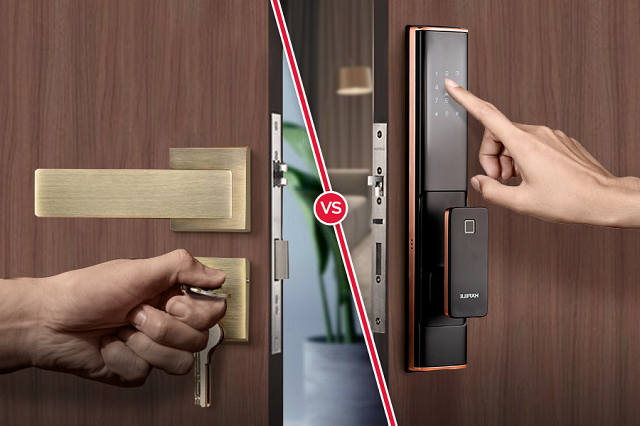Traditional Locks VS Smart Locks: Which One is Better
2024-08-10 11:44

In today's world, the debate between traditional locks and smart locks is increasingly relevant as more homeowners and businesses consider upgrading their security systems. Both traditional and smart locks offer unique advantages and disadvantages, making the choice between them dependent on specific needs and preferences. This article explores the pros and cons of both types of locks to help you make an informed decision.
Traditional Locks: Pros and Cons
Advantages
Simplicity and Reliability: Traditional locks are simple mechanical devices that have been used for centuries. They are easy to operate and don't require electricity or batteries to function, making them highly reliable. Their mechanical nature means they are less prone to malfunction due to power outages or technological failures.Cost-Effectiveness: Traditional locks are generally more affordable than smart locks. The cost of purchasing and installing a traditional lock is usually lower, making it a budget-friendly option for securing doors. Additionally, maintenance and repair costs tend to be minimal, as the mechanisms are straightforward.
Wide Availability: Traditional locks are widely available in various types, sizes, and security levels. Whether you need a basic padlock or a high-security deadbolt, you can easily find a traditional lock that fits your requirements.
Disadvantages
Limited Security Features: While traditional locks can be effective, they often lack the advanced security features found in smart locks. Most traditional locks rely solely on a physical key for access, which can be lost, stolen, or duplicated. This makes them more vulnerable to lock-picking and bumping techniques used by intruders.Lack of Convenience: Traditional locks require physical keys, which can be inconvenient for multiple users. Carrying keys, especially for multiple locks, can be cumbersome, and losing a key can create significant problems, including the need to change the entire lock. At this time, you need to prepare a spare key or a simple Lock Picking Tools, which can reduce a lot of unnecessary trouble.
No Remote Access: One of the main drawbacks of traditional locks is the lack of remote access. You cannot control or monitor a traditional lock from a distance, which limits your ability to manage access when you are not physically present.
Smart Locks: Pros and Cons
Advantages
Enhanced Security Features: Smart locks offer advanced security features that go beyond the capabilities of traditional locks. These features can include biometric access, such as fingerprint scanning, and digital keys that can be shared with multiple users. Many smart locks also offer encryption, making it difficult for unauthorized users to gain access.Convenience and Flexibility: Smart locks provide unparalleled convenience. They can be operated remotely via a smartphone app, allowing you to lock or unlock your door from anywhere. This is especially useful for granting access to guests, service providers, or family members without needing to be physically present. Additionally, smart locks can often be integrated with home automation systems, allowing for seamless control alongside other smart devices.
Activity Monitoring and Alerts: Many smart locks offer real-time activity monitoring, sending alerts to your phone when the lock is used. This feature enhances security by providing instant notifications of any unauthorized access attempts or unusual activity at your door.
Disadvantages
Higher Cost: Smart locks are typically more expensive than traditional locks, both in terms of the initial purchase price and installation costs. The advanced technology and additional features contribute to the higher price point, which may be a barrier for some consumers.Dependence on Power and Connectivity: Smart locks rely on electricity and internet connectivity to function. If the lock's battery dies or there is a power outage, the lock may become unusable or less secure. Additionally, if the lock loses its connection to your home network, you may lose the ability to control it remotely.
Security Vulnerabilities: Despite their advanced features, smart locks are not immune to security risks. They can be vulnerable to hacking, and any weaknesses in the associated smartphone app or network can potentially be exploited by cybercriminals. Regular updates and strong passwords are essential to maintaining the security of a smart lock.
 Promotion: 5% Discount Code: 5vip
Promotion: 5% Discount Code: 5vip